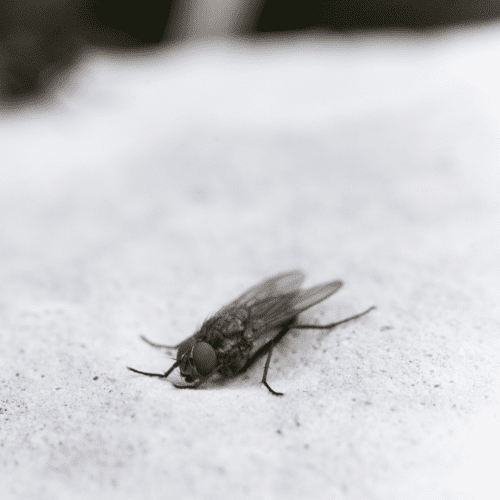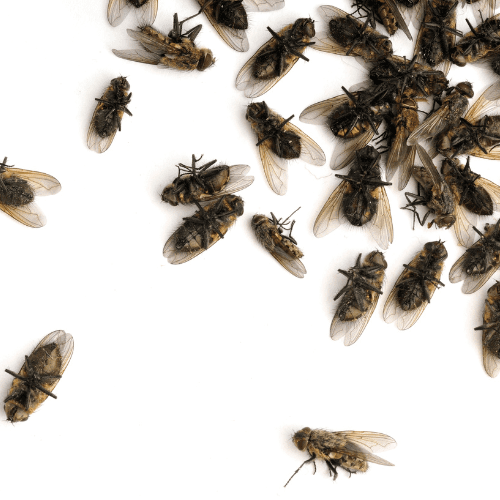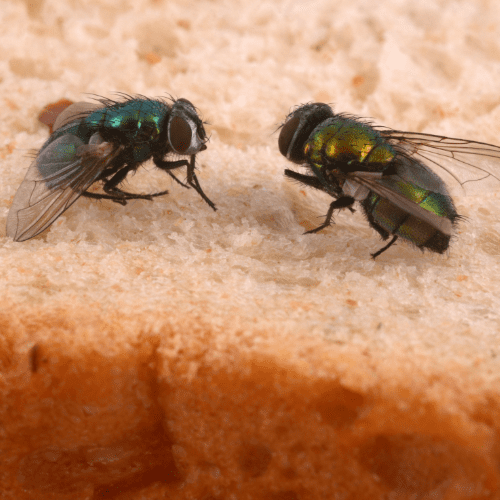


Cluster flies can be a nuisance for homeowners, especially during the fall and winter months. These flies are often mistaken for house flies, but they behave differently and require a different approach for control. Understanding cluster flies and how to keep them out of your house is essential for maintaining a pest-free home.
Cluster flies are not harmful to humans, but they can be a nuisance when they enter homes in large numbers. These flies are typically found in rural areas, but they can also infest urban homes. They are attracted to warm, sunny locations and will often congregate on the sunny side of buildings. Once inside, they will hibernate in wall voids, attics, and other protected areas until the weather warms up again.
Identifying Cluster Flies
Physical Characteristics
Cluster flies, also known as attic flies, are a type of fly that can be identified by their physical characteristics. They are similar to house flies in appearance but are slightly larger and have a different coloration. Cluster flies have a dark gray to black body with golden hairs on their thorax. They also have overlapping wings that are folded over their abdomen when at rest.
Cluster flies are typically larger than houseflies, measuring between 8-10mm in length. They have a sluggish movement and are often seen flying in a zigzag pattern. The color of their body can vary from dark gray to black, with a few yellowish or golden hairs on their thorax.
Behavioral Traits
Cluster flies are part of the genus Pollenia and the family Calliphoridae. They are known for their tendency to hibernate or overwinter in large groups, hence the name “cluster” flies. They are often found in attics, wall voids, and other warm, protected areas of homes.
During the fall months, cluster flies will seek out sheltered areas to overwinter. They will enter homes through small cracks and crevices, and once inside, they will gather in large clusters. In the spring, when temperatures begin to rise, the flies will become active again and will try to make their way back outside.
In summary, identifying cluster flies can be done by observing their physical characteristics such as their size, color, and golden hairs on their thorax. Their sluggish movement and tendency to hibernate in large clusters are behavioral traits that can also help distinguish them from other types of flies.
Life Cycle and Breeding Habits
Reproduction Cycle
Cluster flies reproduce in the late summer and early autumn. The female lays eggs in soil cracks, and the larvae feed on earthworms. The larvae then pupate in the soil, and adult flies emerge in the spring.
Feeding and Habitat
Cluster flies feed on plant nectar and do not breed indoors. They are attracted to warm buildings in the fall, where they hibernate in the walls or attic.
Cluster flies are not harmful to humans, but their presence can be a nuisance. To prevent them from entering the home, seal all cracks and crevices in the exterior walls. Installing screens on windows and doors can also help keep them out.
Seasonal Behavior and Infestation Patterns
Migration and Hibernation
Cluster flies are known for their seasonal behavior. During the fall, they tend to migrate indoors to escape the cold weather. They often enter homes through small cracks and gaps in walls, windows, and doors. Once inside, they seek out warmth and shelter, often settling in attics and wall voids.
In the spring, cluster flies become active again and start to move towards the outdoors. However, some cluster flies may overwinter inside homes, hibernating in wall voids and attics until the following fall.
Infestation Indicators
Infestations of cluster flies can be identified by the presence of dead flies and their excrement. Dead flies are often found in windowsills, light fixtures, and other areas where they may have become trapped. Their excrement looks like small black spots and can be found on walls, ceilings, and other surfaces where the flies have been active.
Swatting at cluster flies is not recommended, as it can release their pheromones and attract more flies to the area. Instead, it is best to use a vacuum cleaner to remove them.
To prevent infestations, it is important to seal up any cracks and gaps in your home’s exterior. This can be done using caulk, weatherstripping, or other sealants. Additionally, keeping your home clean and free of clutter can help reduce the likelihood of a cluster fly infestation.
Preventing Cluster Fly Entry
Cluster flies can be a nuisance when they enter your house. However, there are several ways to prevent them from entering your home. In this section, we will discuss two effective methods: sealing and repairs, and window and door protection.
Sealing and Repairs
To prevent cluster flies from entering your house, it is important to seal all possible entry points. This includes sealing cracks and gaps in the foundation, walls, and roof. Caulk can be used to seal cracks and gaps, while weather stripping can be used to seal doors and windows. It is also important to seal any vents or openings in the attic or crawl space.
Regular maintenance and repairs can also prevent cluster flies from entering your home. Inspect your home regularly for any cracks or gaps and repair them promptly. Make sure that all screens on windows and doors are intact and in good condition.
Window and Door Protection
Window and door protection is another effective method to prevent cluster flies from entering your house. Installing screens on windows and doors can prevent flies from entering your home. Make sure that the screens are in good condition and do not have any holes or tears.
Another option is to install door sweeps on exterior doors. Door sweeps can prevent flies from entering through the gap at the bottom of the door. It is also important to make sure that all doors and windows are closed tightly.
By following these preventive measures, you can keep cluster flies out of your home. Regular maintenance and repairs, along with proper window and door protection, can go a long way in preventing cluster fly entry.
Control and Removal Strategies
Chemical Treatments
Chemical treatments can be effective in controlling and eliminating cluster flies. Insecticides can be used to kill adult flies and prevent larvae from developing. Residual insecticides, such as pyrethrin and residual pyrethroid-based insecticides, can be applied to surfaces where cluster flies are likely to land or rest. It is important to follow the instructions on the product label and use the appropriate protective gear when applying insecticides.
Non-Chemical Methods
Non-chemical methods can also be effective in controlling and removing cluster flies. Vacuuming can be used to remove adult flies from surfaces and eliminate their hiding places. It is important to dispose of vacuum bags or contents immediately to prevent the flies from escaping. Traps, such as flypaper or a glass jar with a piece of fruit inside, can also be used to capture adult flies. Swatters can be used to kill individual flies.
To prevent cluster flies from entering the house, it is important to seal any cracks or gaps in the exterior walls, windows, and doors. Installing screens on windows and doors can also help prevent flies from entering the house. Regular cleaning and maintenance of the house can help eliminate potential breeding sites for cluster flies. If the infestation is severe, it may be necessary to contact a pest control professional or exterminator for assistance.
Understanding the Risks
Health Implications
Cluster flies are not known to transmit any diseases to humans, but they can still pose health risks. When they enter your home, they can leave behind stains and fecal matter that can cause respiratory problems, especially in people with allergies or asthma. In addition, the presence of a fly infestation can be a sign of poor hygiene, which can attract other pests that do carry diseases.
Property Damage
Cluster flies do not cause any structural damage to your house, but they can be a nuisance and cause cosmetic damage. When they die, they can leave behind unsightly stains on walls, curtains, and furniture. In addition, their dead bodies can attract other pests like carpet beetles, which can cause further damage to your property.
To prevent these risks, it is important to take steps to keep cluster flies out of your house. This can include sealing up any cracks or gaps in your home’s exterior, using screens on windows and doors, and keeping your home clean and free of clutter. If you do notice a fly infestation, it is important to take action quickly to prevent the problem from getting worse.
Natural and Home Remedies
Aromatic Deterrents
One of the most effective ways to prevent cluster flies from entering your house is to use aromatic deterrents. These remedies work by creating a scent that is unpleasant to the flies and causes them to avoid the area. Eucalyptus oil is a popular choice for this purpose. Simply mix a few drops of eucalyptus oil with water and spray it around the house. The strong scent of eucalyptus will help to keep the flies away.
Another effective aromatic deterrent is vinegar. Like eucalyptus oil, vinegar creates a strong scent that is unpleasant to the flies. Mix equal parts water and vinegar in a spray bottle and spray it around the house to keep the flies away.
Environmental Adjustments
Making some simple adjustments to your home environment can also help to prevent cluster flies from entering your house. One of the most important things you can do is to ensure that your house is well-ventilated. Cluster flies are attracted to warm, humid environments, so keeping your house cool and dry can help to deter them.
Another important environmental adjustment is to ensure that your house is well-lit. Cluster flies are attracted to light, so keeping your house well-lit can help to keep them away. Additionally, sealing any cracks or gaps in your house can help to prevent the flies from entering.
By using these natural and home remedies, you can effectively prevent cluster flies from entering your house. These remedies are safe, easy to use, and can be very effective in keeping your home free of these pests.
When to Seek Professional Help
If you have attempted to get rid of cluster flies but they continue to infest your house, it may be time to seek professional help. A pest control company or exterminator can assess the situation and provide the necessary treatments to eliminate the infestation.
Professional pest control services have access to stronger chemicals that are not available to the general public. They can also provide a more thorough inspection of your house to identify any areas where cluster flies may be hiding.
If you have a severe infestation, it is important to seek professional help as soon as possible. Cluster flies can reproduce quickly, and a large infestation can cause damage to your home and pose a health risk to you and your family.
In addition, if you have tried multiple methods to get rid of cluster flies but they continue to return, it may be a sign of a more serious underlying issue. A professional exterminator can help identify and address the root cause of the infestation to prevent it from happening again in the future.
Overall, if you are dealing with a persistent cluster fly infestation in your house, it is best to seek the assistance of a professional pest control service or exterminator. They have the knowledge and experience to effectively eliminate the infestation and prevent future occurrences.
Frequently Asked Questions
What natural methods are effective for repelling cluster flies?
There are several natural methods that can help repel cluster flies. Some effective options include using essential oils like lavender, peppermint, and eucalyptus, as well as planting herbs like basil and mint around your home. You can also use vinegar and water solutions to clean surfaces and repel flies. Additionally, sealing cracks and gaps in your home can help prevent flies from entering.
What are the primary attractants for cluster flies in residential areas?
Cluster flies are attracted to warm, sunny areas and tend to congregate near windows and doors. They are also attracted to light and moisture, so areas like attics, basements, and bathrooms can be particularly appealing to them. Additionally, they may be attracted to decaying organic matter like dead animals or plant material.
How can I prevent cluster flies from infesting my home?
Preventing cluster flies from infesting your home involves several steps. First, seal any cracks or gaps in your home’s exterior to prevent flies from entering. Next, make sure your home is well-ventilated and dry, as flies are attracted to moisture. Regularly clean your home, especially areas like attics and basements where flies may congregate. Finally, consider using natural repellents like essential oils or vinegar to keep flies away.
Why are there a large number of cluster flies appearing in my house suddenly?
Cluster flies often appear in large numbers in the fall, as they seek shelter from the colder weather. If you are suddenly seeing a large number of cluster flies in your home, it may be due to a change in weather or temperature. Additionally, if there is a nearby source of decaying organic matter, such as a dead animal, this may be attracting the flies to your home.
What are the best strategies for eliminating cluster flies outdoors?
To eliminate cluster flies outdoors, you can use insecticides or natural repellents like essential oils or vinegar. Additionally, removing any decaying organic matter like dead animals or plant material can help reduce the number of flies in the area. Sealing cracks and gaps in your home’s exterior can also prevent flies from entering.
How can I permanently stop cluster flies from returning to my house?
Permanently stopping cluster flies from returning to your home involves ongoing maintenance and prevention measures. Regularly cleaning your home and sealing any cracks or gaps in the exterior can help prevent flies from entering. Additionally, using natural repellents like essential oils or vinegar can help keep flies away. Finally, removing any decaying organic matter from your property can help reduce the number of flies in the area.

